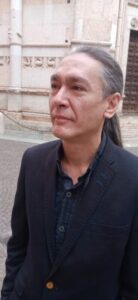by Theo Guzman
The denial is direct, in no uncertain terms and comes from an authoritative source. “My mother has never been under house arrest. This is a lie. People need to know that“. This is explained by Kim Aris, one of the two sons of Aung San Suu Kyi, the Burmese democratic leader imprisoned for the umpteenth time immediately after the February 2021 coup that overthrew her government. Invited to Italy by the Cervi Institute in Gattatico and the Italy-Burma Friendship Association, Kim launched, as part of the week of meetings organised by the House of Peace in Parma, an appeal for an end to the civil war in Myanmar that began immediately after the coup. A war that is out of the spotlight but that has already taken a toll of over 50,000 victims, with bombings pounding a territory where the Resistance is gaining ground every day.

We met him and asked him about a news story that came out at two separate times according to which the Nobel Peace Prize laureate had been moved to a civilian home in the capital. A gesture of humanity, but one that according to Kim only hides the brutality of the ruler. “My mother is in prison as far as I know. And the last person to have actually seen her and to be able to report her whereabouts is her economic advisor Sean Turnell (in the same prison as Suu Kyi he spent 650 days before being released ed). The conditions he described,“ Kim continued, “are terrible: cells infested with rats and no air conditioning… At one point my mother was offered a job, but she said she could not accept a different condition from other prisoners. She refused“.
Lies then, and which have persisted to this day. “The junta does not like people to know what is really going on. They lie to confuse, to appear better than they are. And if people think that my mother is under house arrest, it obviously diminishes attention to her real condition. It is clear that I hope she can get her freedom back, but so far there are no indications that she will really be transferred to house arrest or that she will be released“. Kim also talks about her visit to the Pope on 2 October last year, before Francis’ trip to Asia. A visit that only became known in September after Catholic Civilisation published the pontiff’s conversations with Indonesian Jesuits in which he recalled Kim’s visit and the fact that he “offered the Vatican to welcome“ Aung San Suu Kyi. A strong political message during a visit, which remained secret for a year, “in the company – Kim confirms – of Senator Albertina Soliani“, who remembers that meeting well.
“The Pope,“ says the national vice-president of Anpi, head of the Cervi Institute, “has always had Myanmar in his heart, which he always remembers even when talking about Gaza or Ukraine. In this regard, the Pope has launched an appeal for the release of Suu Kyi and I would say that those with political responsibility should therefore understand to whom it is addressed. I saw in it an openness of the Holy See to possible mediation with a view to reconciliation. And I would also see in it a gesture of openness towards China as if this country and the Vatican could collaborate in this direction. A mediation of this kind,“ concludes Italian Senator Soliani, “would be useful for a process that takes into account all the components: armed ethnic militias, the clandestine government, thorny issues like the Rohingya dossier. Of course, it is also a matter of negotiating with the military, provided they give up their role as a political subject by sitting down at the table. A difficult but not impossible transition towards a federal government that includes all ethnic and social components and an army that brings together all ex-combatants. As for the clandestine government, known as Nug, it should be recognised“.
“One of the few positive effects of the coup,“ Kim added, “is that we saw how so many people came together to resist the military. I think we can work on the basis of this unity that has been cultivated over the past four years, which can help people work together better than in the past. I have faith in a democratic future for Burma and I think it is achievable. It is something my grandfather (Suu Kyi’s father Aung San) tried to encourage when he was alive and it is something my mother always fought for“.
Meanwhile, out of the recent meeting in Laos of Asean, the Southeast Asian regional association, came a Thai proposal to try to resolve a crisis on which the Group of Ten is unable to make progress. The summit in Vientiane, where a senior Burmese civilian official was also present, at least recorded the proposal to hold “informal talks“ in Thailand in December. A proposal, however, that runs the risk of ending up like last year’s, when a similar event saw Indonesia, Malaysia and Singapore distancing themselves from it and the NUG rejecting it.
To learn more, read our Myanmar conflict factsheet
In the cover photo, a poster for the release of Suu Kyi
In the text, Kim Aris in Parma (photo atlanteguerre.it)
























